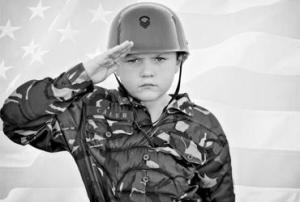My first ‘Aim in life’, as far as I can remember (It was 1988 / 89; I was 2 or 3), was to become a milkman. I mean, it wasn’t about being a milkman. I wanted to become the honest person appreciated by my parents – a milkman. So, what I truly wanted to become was a plain, simple, honest person.

Next, I wanted to become a building mechanic. I used to stare at people who built houses in awe. My uncle sent me a toy Mechanical Tool Box.
My next major change in aim occurred when I wanted to join the Military (age: 4-5). Each night, I used to stay awake until the National Anthem with the National Flag was played on BTV and give salute. I watched a Television program depicting Military life. One of my uncles quipped: “The secret: Tahsin wants to become the President!”.

My mom told me of an incident that took place when I was a baby of few months old. One day, General Ershad was delivering a speech (who was then the President). My mom was studying for her exams. I was lying right beside my maternal Grandfather. My Grandfather suddenly started praying loudly: “God, grant my wish and guide my grandson to become the President and lead the Nation.” My Grandmother called my mom, “Come! Quick! Look how your dad is praying for your son!”
During my First grade, a serial had an enormous influence on me: “The sword of Tipu Sultan”. Tipu Sultan and Hyder Ali were my childhood heroes. The serial drew me to History. I was deeply influenced by another historical novel during 3rd / 4th Grade – “Khun Ranga Path”. Besides History, books on General Knowledge were among my favorites from an early age. My father bought me my first “General Knowledge” book (Encyclopedia) around 5. Then I discovered “General Knowledge” books (Encyclopedia) in my aunt’s house. Later, I started buying Encyclopedia myself. I used to stare at the Globe of the world and fantasize (Grade 3 / 4). I fantasized first becoming a King of Ancient Bengal, then King of Myanmar (Burma) and later lifetime President of Kazakhstan.
I remember playing computer games at one of our relative’s house during Fifth grade. Almost everyone around me wanted to become a Computer Engineer at that time. So I thought I should try to become one myself – a Computer Engineer.
During my middle school years, I was a voracious reader of novels. Reading novels was the most fun activity I could think of. I could understand different writing techniques employed by novelists. Becoming a novelist, writing great novels was my dream during 7th to 10th grade (1999 – 2002). For living, I would become a Physician or Engineer or Architect. That was my plan.
During 9th / 10th grade, I made up my mind to study Medicine (there was huge encouragement from my parents) and become a Physician besides writing novels.
When I read a book on Psychology (my mom’s book on Educational Psychology from her M.Ed. course), I understood that an intense interest in the workings of the human mind was the chief reason I wanted to become a novelist. Moreover, Literature could only depict subjective human experience, but the objective theories of Psychology applied to all humans.
I thought that I could become a Physician and specialize in Psychiatry or Neurology.
Studying Psychology helped me understand the essence of Science: To understand experimentally provable General Rules that govern everything we see around us.
Studying Psychology books gave me the confidence that: I can come up with original ideas, and that I should question what is written in books.
Trying to understand the theories of Psychology in terms of my own experiences and what I see around me, made me aware of the connection between Real World and the world of Books and Theories.
As I later diversified and ventured into different branches of Science, these realizations and understandings proved invaluable.
One day, as I was preparing for my high school (11th grade) Entrance Exam (later it was decided that Entrance would be based on results of matriculation exam), a Chapter on different forms of Energy from my Physics book grabbed my attention. I thought: maybe I could work on both Psychology / Neurology and Physics. I went through my 9-10th grade Physics book. I bought and read other books (Undergraduate level Physics Textbooks, Stephen Hawkin’s A Brief History of Time and others).
I thought and wrote down my understandings and realizations. I tried to come up with new Theories myself.
Physics taught me to understand “everything” in terms of fundamental constituents and few fundamental laws that govern things we see around us.
Physics made me realize the necessity of learning Higher Mathematics.
Mathematical Olympiad was gaining popularity in Bangladesh at that time (it was 2003). I bought Books and started solving problems.
One of the books published at that time was “নিউরনে অনুরণন” (“Resonance in neurons”). The idea for the name: it’s better to create resonance in your brains’ neurons by solving Mathematical problems rather than leaving the neurons idle!
I found out: the more I worked on problems, the better I could think! My Neurons really were resonating!
My interest in Psychology helped me appreciate brain function improvement and Mathematical Problem Solving. I discovered ways of improving brain function myself.
It was an amazing realization – I could become anyone I wanted if I worked in the right way.
Other Sciences started grabbing my attention.
Psychology drew me to Neuroscience – the Biology of what happens in the mind. Physics led me to Cosmology (the study of the evolution of the Universe) and some of the books described evolution of our planet and Biological evolution. Evolutionary Biology was among my favorites.
At that point, I saw my future as a Scientist: trying to understand the truth and decode the Laws of Nature.
I became interested in Computer Science and Engineering as I read an article portraying the field of Artificial Intelligence. The article was written by Dr. Ali Asgar included in one of his popular science books (Grade 11). I bought Undergrad Texts on Artificial Intelligence and started reading.
Psychology and Neuroscience always grabbed my attention. So when I found out that there is a subfield in CS that tries to emulate intelligence on computers, I got hooked instantly.
Later, I participated in International Mathematical Olympiad, and met people who were serious participants in programming contests and I felt that I really liked contests and competitions. Besides, computation seem to be everywhere – required in almost every branch. I could do Physics and Biology on Computers. I read an inspirational book (“Medhabi Manusher Golpo” – Prof. Dr Kaykobad) which depicted lives of eminent Computer Scientists and students of Computer Science. The choice was either Physics or Computer Science and Engineering, but my parents wouldn’t let me study Physics. Choosing Computer Science and Engineering also made sense when I considered practical aspects. I thought: I could still pursue my multi-disciplinary interests besides studying CSE at college.
The Majors I considered at that time included: Computer Science and Engineering, Physics, Mathematics, Neuroscience, Nanotechnology / Nanoengineering & Bioengineering / Biomedical Engineering.
[If you find my life and my understandings interesting you might like Looking back and connecting the dots.]
Lets move a few years forward … During March / April 2013, I thought, I should analyze and understand and learn from and codify everything I see around me – just as I did with the sciences and engineering. I started with the political situation in Bangladesh. I wanted to figure out what would happen if I start my own Political Party. Next, I applied my analysis to other domains: Mechanical Engineering, Economics, Computer Science.
I come across new understandings and realizations almost on a daily basis. I look forward to share my newer understandings at sometime in not too distant future: “
Living to tell the tale”, truly!


You must be logged in to post a comment.